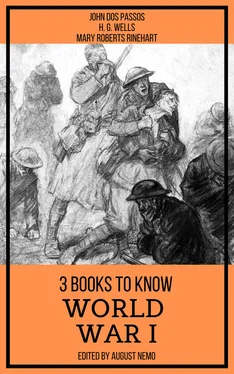John Andrews lay on his back on his cot while everyone about him slept and snored in the dark barracks. A certain terror held him. In a week the great structure of his romantic world, so full of many colors and harmonies, that had survived school and college and the buffeting of making a living in New York, had fallen in dust about him. He was utterly in the void. “How silly,” he thought; “this is the world as it has appeared to the majority of men, this is just the lower half of the pyramid.”
He thought of his friends, of Fuselli and Chrisfield and that funny little man Eisenstein. They seemed at home in this army life. They did not seem appalled by the loss of their liberty. But they had never lived in the glittering other world. Yet he could not feel the scorn of them he wanted to feel. He thought of them singing under the direction of the “Y” man:
“Hail, Hail, the gang's all here;
We're going to get the Kaiser,
We're going to get the Kaiser,
We're going to get the Kaiser,
Now!”
He thought of himself and Chrisfield picking up cigarette butts and the tramp, tramp, tramp of feet on the drill field. Where was the connection? Was this all futile madness? They'd come from such various worlds, all these men sleeping about him, to be united in this. And what did they think of it, all these sleepers? Had they too not had dreams when they were boys? Or had the generations prepared them only for this?
He thought of himself lying under the crepe-myrtle bush through the hot, droning afternoon, watching the pale magenta flowers flutter down into the dry grass, and felt, again, wrapped in his warm blankets among all these sleepers, the straining of limbs burning with desire to rush untrammelled through some new keen air. Suddenly darkness overspread his mind.
He woke with a start. The bugle was blowing outside.
“All right, look lively!” the sergeant was shouting. Another day.
––––––––
THE STARS WERE VERY bright when Fuselli, eyes stinging with sleep, stumbled out of the barracks. They trembled like bits of brilliant jelly in the black velvet of the sky, just as something inside him trembled with excitement.
“Anybody know where the electricity turns on?” asked the sergeant in a good-humored voice. “Here it is.” The light over the door of the barracks snapped on, revealing a rotund cheerful man with a little yellow mustache and an unlit cigarette dangling out of the corner of his mouth. Grouped about him, in overcoats and caps, the men of the company rested their packs against their knees.
“All right; line up, men.”
Eyes looked curiously at Fuselli as he lined up with the rest. He had been transferred into the company the night before.
“Attenshun,” shouted the sergeant. Then he wrinkled up his eyes and grinned hard at the slip of paper he had in his hand, while the men of his company watched him affectionately.
“Answer 'Here' when your name is called. Allan, B.C.”
“Yo!” came a shrill voice from the end of the line.
“Anspach.”
“Here.”
Meanwhile outside the other barracks other companies could be heard calling the roll. Somewhere from the end of the street came a cheer.
“Well, I guess I can tell you now, fellers,” said the sergeant with his air of quiet omniscience, when he had called the last name. “We're going overseas.”
Everybody cheered.
“Shut up, you don't want the Huns to hear us, do you?”
The company laughed, and there was a broad grin on the sergeant's round face.
“Seem to have a pretty decent top-kicker,” whispered Fuselli to the man next to him.
“You bet yer, kid, he's a peach,” said the other man in a voice full of devotion. “This is some company, I can tell you that.”
“You bet it is,” said the next man along. “The corporal's in the Red Sox outfield.”
The lieutenant appeared suddenly in the area of light in front of the barracks. He was a pink-faced boy. His trench coat, a little too large, was very new and stuck out stiffly from his legs.
“Everything all right, sergeant? Everything all right?” he asked several times, shifting his weight from one foot to the other.
“All ready for entrainment, sir,” said the sergeant heartily.
“Very good, I'll let you know the order of march in a minute.”
Fuselli's ears pounded with strange excitement. These phrases, “entrainment,” “order of march,” had a businesslike sound. He suddenly started to wonder how it would feel to be under fire. Memories of movies flickered in his mind.
“Gawd, ain't I glad to git out o' this hell-hole,” he said to the man next him.
“The next one may be more of a hell-hole yet, buddy,” said the sergeant striding up and down with his important confident walk.
Everybody laughed.
“He's some sergeant, our sergeant is,” said the man next to Fuselli. “He's got brains in his head, that boy has.”
“All right, break ranks,” said the sergeant, “but if anybody moves away from this barracks, I'll put him in K. P. Till—till he'll be able to peel spuds in his sleep.”
The company laughed again. Fuselli noticed with displeasure that the tall man with the shrill voice whose name had been called first on the roll did not laugh but spat disgustedly out of the corner of his mouth.
“Well, there are bad eggs in every good bunch,” thought Fuselli.
It gradually grew grey with dawn. Fuselli's legs were tired from standing so long. Outside all the barracks, as far as he could see up the street, men stood in ragged lines waiting.
The sun rose hot on a cloudless day. A few sparrows twittered about the tin roof of the barracks.
“Hell, we're not goin' this day.”
“Why?” asked somebody savagely.
“Troops always leaves at night.”
“The hell they do!”
“Here comes Sarge.”
Everybody craned their necks in the direction pointed out.
The sergeant strolled up with a mysterious smile on his face.
“Put away your overcoats and get out your mess kits.”
Mess kits clattered and gleamed in the slanting rays of the sun. They marched to the mess hall and back again, lined up again with packs and waited some more.
Everybody began to get tired and peevish. Fuselli wondered where his old friends of the other company were. They were good kids too, Chris and that educated fellow, Andrews. Tough luck they couldn't have come along.
The sun rose higher. Men sneaked into the barracks one by one and lay down on the bare cots.
“What you want to bet we won't leave this camp for a week yet?” asked someone.
At noon they lined up for mess again, ate dismally and hurriedly. As Fuselli was leaving the mess hall tapping a tattoo on his kit with two dirty finger nails, the corporal spoke to him in a low voice.
“Be sure to wash yer kit, buddy. We may have pack inspection.”
The corporal was a slim yellow-faced man with a wrinkled skin, though he was still young, and an arrow-shaped mouth that opened and shut like the paper mouths children make.
“All right, corporal,” Fuselli answered cheerfully. He wanted to make a good impression. “Fellers'll be sayin' 'All right, corporal,' to me soon,” he thought. An idea that he repelled came into his mind. The corporal didn't look strong. He wouldn't last long overseas. And he pictured Mabe writing Corporal Dan Fuselli, O.A.R.D.5.
At the end of the afternoon, the lieutenant appeared suddenly, his face flushed, his trench coat stiffer than ever.
“All right, sergeant; line up your men,” he said in a breathless voice.
All down the camp street companies were forming. One by one they marched out in columns of fours and halted with their packs on. The day was getting amber with sunset. Retreat sounded.
Читать дальше












